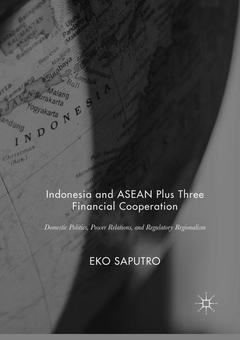Contents ...................................................................................................................... 3
List of Figures ............................................................................................................. 5
List of Tables .............................................................................................................. 6
List of Abbreviations ................................................................................................. 7
Introduction .............................................................................................................. 12
Indonesia and the Dynamics of Regional Financial Cooperation .......................... 12
Why Indonesia matters .......................................................................................... 16
Explaining Financial Regionalism in East Asia .................................................... 28
Reviewing the research on East Asian financial regionalism ................................ 29
Power relations .................................................................................................. 34
Domestic factors ................................................................................................ 38
Regulatory regionalism .......................................................................................... 44
The Progress of East Asian Financial Regionalism .............................................. 54
ASEAN .................................................................................................................. 55
APEC ..................................................................................................................... 61
APT Cooperation ................................................................................................... 62
The CMIM ......................................................................................................... 63
The ABMI .......................................................................................................... 67
ASEAN and APT are more concrete than APEC .................................................. 69
Domestic Politics in Indonesia and Financial Regionalism in East Asia ............ 71
Political change and varying approaches to regional cooperation ......................... 72
The non-democratic era ..................................................................................... 72
Habibie’s transitional administration ................................................................. 76
The democratic era ............................................................................................. 77
The impact of democratisation ............................................................................... 82
Separation of power under democratic regimes................................................. 83
Changes to financial institutions and policy making ......................................... 85
Independence and coordination ......................................................................... 90
Transparency and economic openness ............................................................... 93
Wider participation ............................................................................................ 95
Power Relations, Bilateral Ties and Indonesia’s Responses ................................ 98<
Japan, China and the APT: cooperation, competition and compromise ................ 99
Indonesia’s approach: maintaining Japan and welcoming China ........................ 105
Reciprocity with Japan ..................................................................................... 105
Ideology, pragmatism and relations with China .............................................. 111
An independent stance? ....................................................................................... 119
Why perceptions matter ................................................................................... 125
Indonesia and the CMIM ...................................................................................... 131
The CMIM’s evolution as a crisis counter measure ............................................ 132
Enhancing transnational policy coordination................................................... 133
Regional initiatives with global standards ....................................................... 139
Broadening participation .................................................................................. 148
De-politicising regional assistance .................................................................. 149
Fully supporting the CMIM ................................................................................. 150
Reaping benefits for the Indonesian economy ................................................. 150
Limited participation of non-state actors ......................................................... 156
National coordination networks ....................................................................... 158
Internal transformation and de-politicisation ................................................... 163
Indonesia and the ABMI ....................................................................................... 171
APT bond market initiatives ................................................................................ 173
The CGIF ......................................................................................................... 173
The ABMF ....................................................................................................... 174
Non-state actors in bond market projects......................................................... 177
Standardisation and harmonisation projects .................................................... 179
Enhancing collaborative work ......................................................................... 183
Limiting political aims ..................................................................................... 184
Indonesia’s complicated stance on the ABMI ..................................................... 185
Growing participation of non-state actors........................................................ 189
Complex policy coordination ........................................................................... 192
Mixed responses to standardisation and harmonisation .................................. 195
Minimal effects of de-politicisation ................................................................. 207
Conclusion .............................................................................................................. 209
Factors affecting Indonesia’s responses ............................................................... 210
The domestic political economy ...................................................................... 211
The de-politicisation of regulatory agencies .................................................... 213
Internal policy coordination ............................................................................. 214
Bilateral interdependence and perceptions ...................................................... 215
Theoretical contribution and refinement .............................................................. 216
Directions for further research ............................................................................. 219
Indonesia’s policy options ............................................................................... 220
The direction of East Asian financial regionalism ........................................... 221
Implications for further research ...................................................................... 223
Appendix: List of interviewee ............................................................................... 224
References ............................................................................................................... 225




